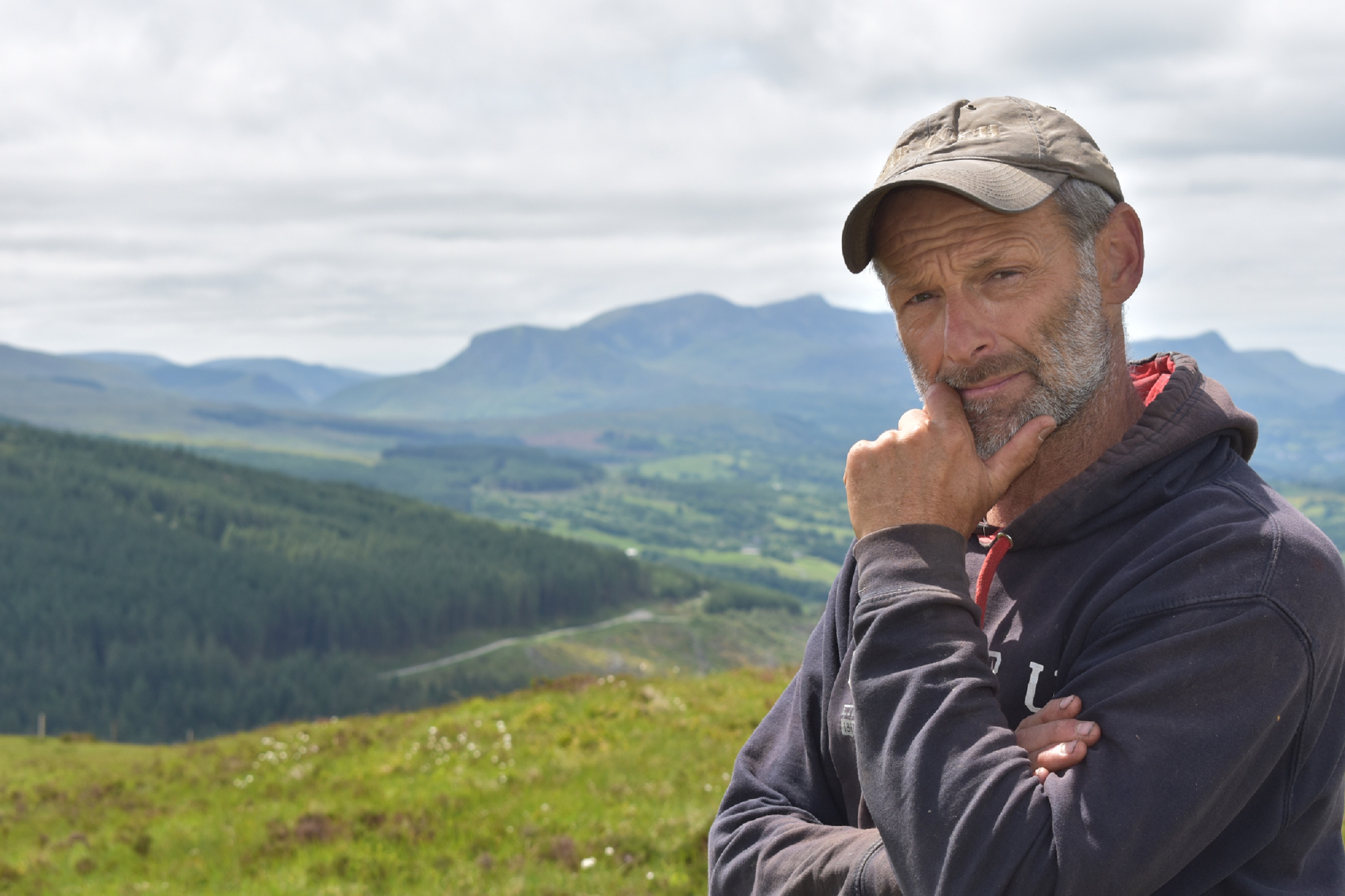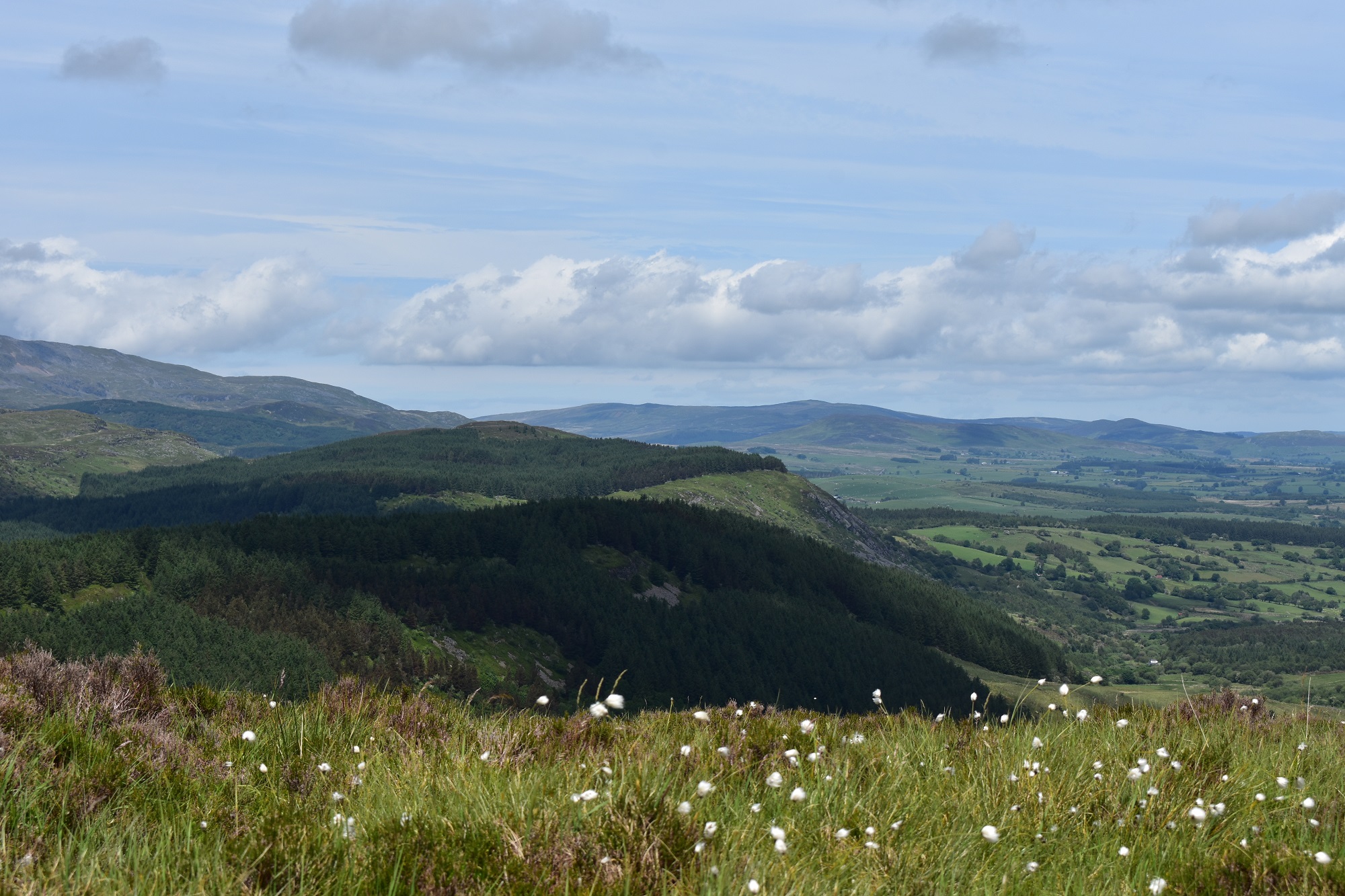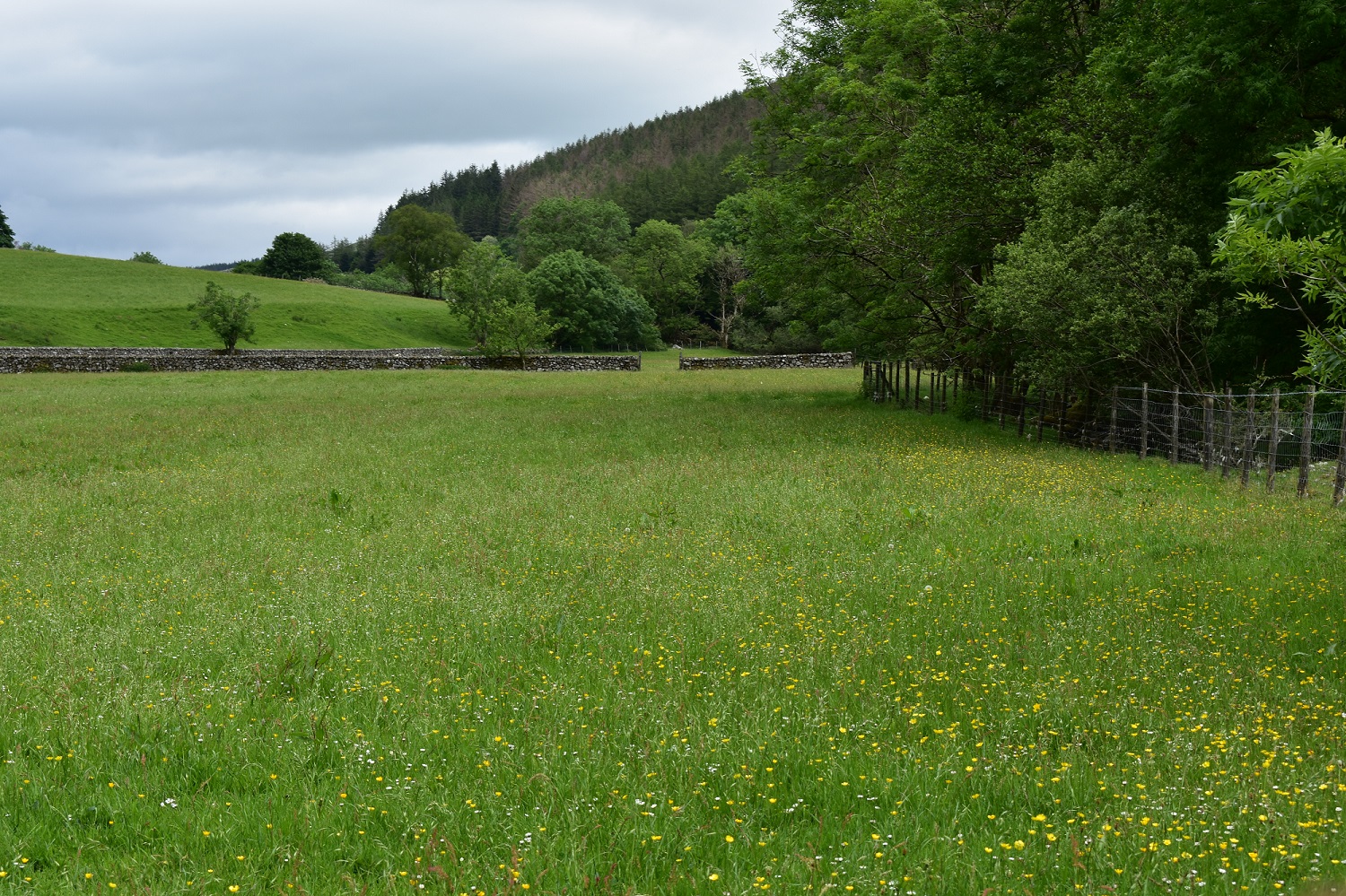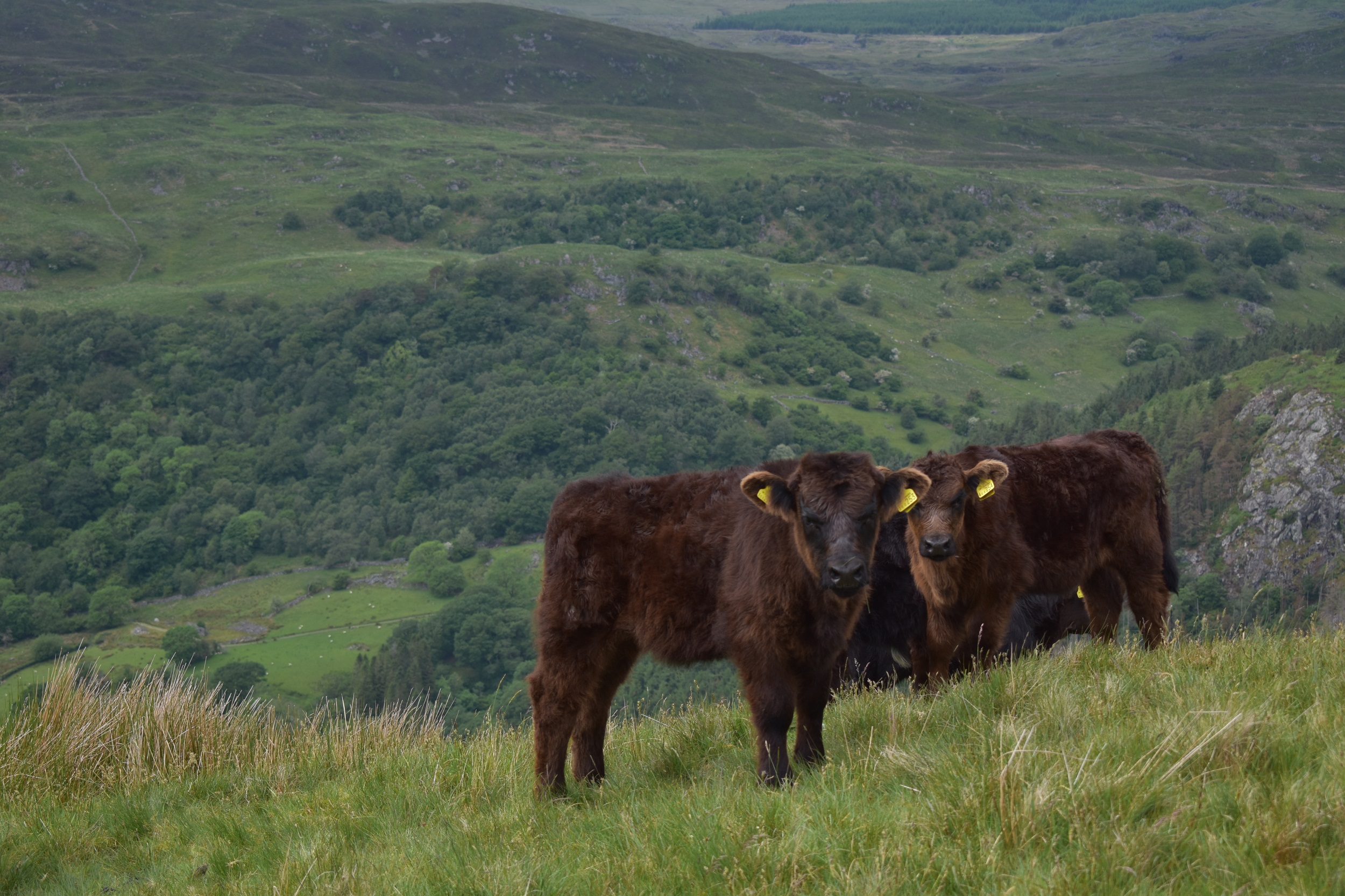 A short drive from Dolgellau, Meirionnydd, just off the main road is Cae Coch farm, Rhydymain, home of well-known TV presenter and farming champion Alun Edwards. Driving up a short farm track, it is impossible not to notice how green it is here.
A short drive from Dolgellau, Meirionnydd, just off the main road is Cae Coch farm, Rhydymain, home of well-known TV presenter and farming champion Alun Edwards. Driving up a short farm track, it is impossible not to notice how green it is here.
The eye is drawn up to the surrounding hills, the trees envelope the interspersed small fields, none of which are bigger than 5 acres. The fields here are not square and there is a mosaic of them. Some are scattered with a modicum of animals - Welsh Black cattle and their calves are resting, chewing the cud; a few sheep are visible on the mountain ridges.
It is obvious that this land is being looked after by someone. There are hay fields with flowers in them, buttercups and daisies. The land is not pushed here and there are docks, thistles and dandelions. The fields have hedges and stone walls as borders, and have been here since the middle ages.
Moving up through the land, it’s sloping and north facing, shrub land or ffridd land as it's called here is followed by unimproved land that includes gorse. There is purple heather on a crested flat and then you get to the white mountain - where you find sedge grasses and the sheep graze in the summer.
Wherever you look it feels like a combination of wild and managed land.
The farm itself includes 735 acres with a turnover of £60-70k a year. It’s a mountain farm and it’s worth making that distinction between hill and mountain farms, as it goes up to almost 3000 feet. The farm is situated on the Aran Fawddwy ridge and out of those 735 acres 480 acres are not accessible by tractor.
There is molinia and sedge grass on the mountain and below that about 100 acres of blanket bog and heather where some of the cattle are. Alun makes silage on approximately 33 acres to provide winter feed for the 18 Welsh black cows and the bull and a few offspring. 600 Welsh mountain ewes also call the farm home.This along with the subsidy and environmental scheme payments is what keeps Alun Edwards going, something he says the industry depends on.
Though well established in the farming community today, Alun’s farming career was not an immediate choice. He explains: “When I took over the farm in 1997 on the death of my father, I was 37 years old and a professional actor. I wasn’t brought up as a farmer. Yes I could shear but I was encouraged to go away. I'm a product of that generation where your parents wanted something better for you and they came from the post war era where they have seen some tough times as farmers.
“They thought well if your kid is bright enough, they should go away and have a much easier and better paid life than we had. However, by now I’ve spent the last 20 years trying to encourage people to look at farming and countryside work as a viable future and a lot of that comes down to environmental work but of course, it’s not for everyone.
“People talk romantically about the land and their connection to it but it’s hard here. The winters are long,cold and wet. We struggle through them to get to May. It is challenging here. But I work with nature not against it. If you work against nature you will never win. However, I felt a moral responsibility to come home to farm after my father died and my mother wanted to keep the farm. People have different connections to the land and why they do what they do. Mine was family loyalty. It was my conscience that brought and kept me here initially.”
Alun understands the need to look after the environment around him and the role food production plays in maintaining biodiversity and habitats, but also the role farmers play in the wider rural economy, culture and society. He says: “We’re a small country, distinct in our culture and I live through the Welsh language here. We’re happy to conserve walls, birds, trees and the Welsh language. You can hear traffic, so we’re not too far from the road and civilization. I can do all my business within 8 miles of the farm. It’s a vibrant place and people are busy working, earning a living and bringing up families.
 “My father rejected the environmental pilot scheme that was introduced first - Tir Cymen - because it meant destocking about 100 ewes. He felt that his speciality was sheep and cattle and he was not convinced that it would balance out in terms of income. Many farms in the area were the same at the time.
“My father rejected the environmental pilot scheme that was introduced first - Tir Cymen - because it meant destocking about 100 ewes. He felt that his speciality was sheep and cattle and he was not convinced that it would balance out in terms of income. Many farms in the area were the same at the time.
“When I came here and looked at the finances, I felt that from a financial point of view it would be reasonable to go into an environmental scheme, which then was Tir Gofal. Initially I went into it for the money, I have to be honest. I was constantly reading up about things and by now we’ve reached a point where we realise that farmers were doing a lot of environmental work before such schemes existed. There was no recognition of it then and certainly not from a public goods point of view.”
The Tir Gofal scheme initiated an enthusiasm in Alun to do more for the environment around him. Walking down the farm track to check on some of the cattle that graze the lower part of the fields he says: “I became enamoured with environmental schemes. Tir Gofal worked well and you could grow your understanding of many things like wildlife corridor connectivity.
“We looked at the historical environment, we’ve been restoring dry stone walls, and if you think they’ve been here for over 1000 years it’s what people come to see when they come to visit. That is a public good but also a blessing for us.
“Once you start looking at things like that you look at the stone in that wall and you see it’s covered in lichen and moss - it's got life on it. There are gaps for rabbits and the other day, I was walking past a farm building and I could hear birds nesting in a crack in the wall.
“I do a little bit of surface reseeding here too but I also include things like bee bombs on rough margins; you have to see the big picture. It’s not just about cattle and sheep here by any means. The environment and our management of it has now become just as central to our existence and our aims.”
With the help of friends and neighbours Alun has planted 20 thousand hedging trees on the lower lands but he is concerned about tree planting ambitions by the Welsh Government. “Where are they going to put them? I know where I would put more trees - on my poorest land but I can’t do that because it has been denoted as habitat and the government has decided that we have to freeze habitat in its present state. So the only place left to plant trees is what we call our white lands - land which has been improved and which we use for the production of food.
“We’re not going to do that, so the only way I can see that we can do it here is to plant them along every single fenced border I have. I have a lot of double fenced hedges now and I’ve also added new skills to my portfolio. I’ve become a hedgelayer and it’s a beautiful, satisfying thing to do in the winter. You can see the difference in wildlife in the winter.”
Improvement works on the river that’s running through the farm has been started and in 2000 Alun was approached to fence out the river bank to keep the cattle out. He has also planted trees on those banks including black poplar. “The problem was of course that once we fenced it all off it became a bit of a weed bank, including Japanese Knotweed. We had some support from the National Park to deal with that, which was good.”
A few years ago, Alun provided the Environment Agency with land for a fish breeding pool, where 8,000 sea trout and salmon were tagged and reared before being released back into the Wnion river. “The results weren’t fantastic though and about 5 years ago they closed all the hatcheries because it was felt they didn’t want to breed artificially and rather let nature take its course. Now we're looking at the habitats for fish in the river.
“We’ve added big rocks in the middle to restore pools, so the gravel collects behind them and makes ideal nesting places for the salmon and sea trout. We’ve also added big trees into the river and pinned them down, to create resting shelters for migratory fish on their way to spawn. We take every opportunity we can to enhance biodiversity, while still maintaining our primary role of producing food. People like Welsh lamb and beef,” he says.
 It is clear that the environmental work here is carried out with passion and enthusiasm, from dry stone walling, planting trees, and hedge laying and recently Alun joined a flood prevention scheme with the Snowdonia National Park. He explains: “We were approached by Rhys Owen from Snowdonia National Park as there was a scheme coming up and of course, the original sources of our rivers are mainly in upland catchments. We’ve got 10 farms involved and the whole of this upper valley is now in a flood prevention scheme.
It is clear that the environmental work here is carried out with passion and enthusiasm, from dry stone walling, planting trees, and hedge laying and recently Alun joined a flood prevention scheme with the Snowdonia National Park. He explains: “We were approached by Rhys Owen from Snowdonia National Park as there was a scheme coming up and of course, the original sources of our rivers are mainly in upland catchments. We’ve got 10 farms involved and the whole of this upper valley is now in a flood prevention scheme.
“As part of our work with the scheme we slow down any water that runs off our hills and we’ve closed some of the ditches on the upland peat bogs; we plant hedges across slopes so that the water hits them and absorbs some of it.
“We build dams and ditches to step water down into the river and make pools and ponds. I will be creating a pond soon that will collect water from the main road. The amount of pollutants from the main road is crazy - fragments of tyres, salt from gritting. If we can catch it before it goes into the rivers and create sumps we should be doing it. Of course, those sumps are also going to be biodiverse habitats for frogs and certain birds. I’m interested to see how that will work out. Things always change.”
Standing in 6 acres of woodland on sloping land, which is not suitable for livestock grazing, it was fenced out and 300 oak trees were planted. “My research led me to believe that an oak woodland gives you the best options as far as biodiversity is concerned. Though what has happened is that some of the oaks struggled a bit but the birch came like crazy. If we left it they would probably take over. The next step for something like this is to cut down a few trees to make glades. If you don’t have sunlight touching the ground you lose biodiversity,” said Alun.
There is wild garlic and strawberries growing here in the woods and a sense of calm takes over. Alun is not opposed to opening small sections of the land to visitors. “This land could be opened up for people to visit. I can imagine this space being used for care-farming. We sometimes forget how many benefits there are to spending time outdoors and some people need access to such spaces. There are some very damaged people out there for whom it would be a blessing to be out here. It’s all encompassing, gentle and calm. There are so many smells here, living creatures. All of life is here in this little microcosm and I’m sure if we let people in we could help their mental states a great deal,” he says.
Heading up to the mountain,where the panoramic views are breathtaking, Alun explains the benefits of keeping a mix of livestock. “We keep cattle here and we graze them quite high. I know I penalise the cattle grazing them high on the heather moorland, because they don’t produce as well but they do wonders for the land. We’ve still got a few grouse up there.
“I remember a time, when my father was still here, when all the heather was the same height. They were almost like trees on those 100 acres and nothing would go there. You couldn’t burn it because of nearby conifer woodland, so the obvious answer is to let the livestock do the job. But you can’t be too heavy handed with the livestock because that won’t help the situation either. I hope by doing it the way we do it now, we create a much more varied option for ground nesting birds such as the snipe.
“One of the things farmers are being encouraged to concentrate on, is having a mix of sheep and cattle grazing the mosaic habitat. It’s really good here on the blanket bog and heather moorland because we have the Welsh clearwing here. You have to have your wits about you to see them but the micro things are just as important as the big things,” he adds.
As well as adding solar panels on the cattle sheds, which means the farm is now more or less independent in terms of electricity, Alun has decided to start keeping bees. “Last year I embarked on that journey and signed up with a mentor from Farming Connect and it looks like they have overwintered well but some of them have swarmed. Half of them are still with me and I’m now building a second hive.
“In planting all those trees here on the farm, we’ve created flowers all year round and that’s really good for our pollinators. Willow hedges in the boggy areas, then the Hazel will flower, we’ve got Blackthorn flowering when nothing else is in flower and gorse, and then we get the Hawthorn, which has been tremendous this year. We’re building up a portfolio of what we as farmers always did but maybe we weren't aware of how beneficial it was,” he said.
 Taking all of the conservation and environmental work being done on this farm into account, it’s easy to understand the frustration Alun feels about how the industry is portrayed. “I’m not sure why our industry has been picked out as a bad example when there are industries such as energy, transport and construction that have also got a role to play in reducing greenhouse gas emissions.
Taking all of the conservation and environmental work being done on this farm into account, it’s easy to understand the frustration Alun feels about how the industry is portrayed. “I’m not sure why our industry has been picked out as a bad example when there are industries such as energy, transport and construction that have also got a role to play in reducing greenhouse gas emissions.
“I’m surprised so much emphasis is put on cattle. However, if you look at the wider context of who is behind these things, it's big corporations. I’m worried about who is buying up all the land. Once the small farms get squeezed out, which is what will happen and my farm may well be one of them, it will be big farms taking over. Small family farms are seen as an inconvenience in the global picture of big business. It’s not a coincidence that people like Bill Gates are making things like the ‘impossible burger’. They’re setting trends and finding ways to sell that ideal image. I’m not sure who is following who, especially as vegan and vegetarianism are still a minority of the consumers.”
Climate change, he adds, we’re all aware of but he struggles to see what more he can do as an individual. “I always strive to be conscientious. We recycle our plastics, we recycle our cow waste. For every cow I keep that emits methane she also provides fertiliser so that the grass grows and that grass then absorbs CO2 - it’s a balance. I find that probably, if we look at the figures that are coming out in terms of emissions the whole picture isn’t considered and they’re only looking at the negatives rather than balancing it against the positives. We do what we can but we need the government to do more and things need to be done at scale.
“All we want as farmers is to work in partnership but that partnership is breaking down at the moment. It’s a pity really. You can’t be at loggerheads if you want results,” he said.


